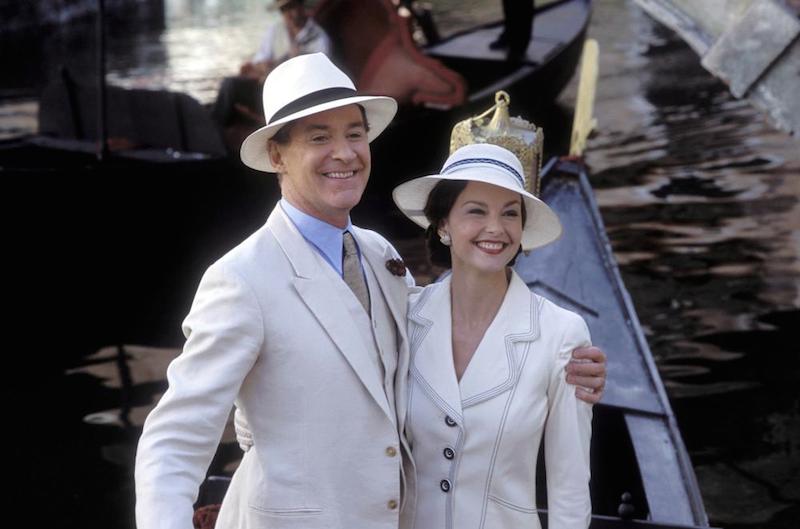
Milos Forman’s “Hair” was a fitting choice to open the 19th installment of Ebertfest, with its topical recurring themes of tolerance, pluralism and sexuality. On Sunday, the festival closed on an appropriately wistful note with a screening of Irwin Winkler’s 2004 portrait of Cole Porter, “De-Lovely.” Chaz Ebert’s introduction was an achingly emotional one, as she reflected on Roger’s love of singing. When he saw a great musical—even ones populated by untrained singers—he found the melodies infectious. One of his recent favorites was Robert Altman’s final film, 2006’s “A Prairie Home Companion,” a picture that serves as a celebration of life as well as a farewell to it. The same could be said of “De-Lovely,” which also happens to star the scene-stealer of Altman’s swan song, Kevin Kline. After Chaz brought out festival director Nate Kohn and assistant festival director Casey Ludwig to take a final bow, they presented her with a bouquet of flowers, a tradition that Roger used to do at the end of every festival. Overcome with emotion, Chaz revealed that she still receives flowers several times a year that Roger had ordered for her before his death in 2013. This revelation left the audience in tears well before the lights went down.
“De-Lovely” is the perfect film to end a critic’s film festival, since it invites Porter to be a critic of his own biopic. An inspired framing device allows him to comment on his life as it unfolds in front of him, barking out directions that none of the “performers” can hear (“It’s too early for another song!” he protests). There are even moments during his memories where he appears to be directing the people around him, asking his wife mid-conversation, “How do you want to play this?” Ashley Judd portrays his wife, Linda Lee, a woman whose abusive first husband left her with little interest in sex, which makes the openly gay Porter a nature fit for her. He often tells her, “I love you,” but admits that “the words always work better with music under them.” Kline’s trademark exuberance proves to be a major asset in the film’s dance sequences, such as the comedic showstopper, “Be a Clown,” the song that later was rewritten into “Make ‘Em Laugh” (performed by previous Ebertfest guest Donald O’Connor in “Singin’ in the Rain”). There are also several cameos by major pop singers providing their own reinterpretations of Porter classics. I’ll admit that when Elvis Costello showed up, I initially thought he was Michael Barker, the Sony Pictures Classics co-founder and co-president who interviewed Isabelle Huppert at the festival this year (if he’s back next year, I encourage him to belt out “Be a Clown” prior to screening “Toni Erdmann”). Robbie Williams’ lovely rendition of the title tune was also used for Michael Mirasol’s marvelous festival trailer preceding several of this year’s features, earning applause each time it materialized. Most moving of all was “Every Time We Say Goodbye,” as sung by the late Natalie Cole.
“Access Hollywood” producer Scott Mantz joined Kohn onstage to moderate a post-film discussion with Winkler and his son, Charles (who was the film’s co-producer). At age 85, Winkler appears as unstoppable as Norman Lear did when he graced the stage earlier in the weekend. As the Oscar-winning producer of “Rocky,” Winkler has enough immortal credits to fill a festival of his own, and Mantz couldn’t resist asking him about his other Best Picture-nominated films, “The Right Stuff” and “Goodfellas.” Many of Winkler’s most acclaimed pictures are his collaborations with Scorsese, and he mentioned that their most recent project, “The Irishman,” aims to re-team Robert De Niro with his former co-stars Harvey Keitel, Al Pacino and Joe Pesci, who will all appear at varying ages, courtesy of a “de-aging process” developed by Industrial Light and Magic. The costliness of the technique combined with the film’s lack of Marvel superheroes will likely cause it to wind up on Netflix in addition to limited theatrical engagements. Winkler and his cinematographer Tony Pierce-Roberts (“The Remains of the Day”) paid homage to Scorsese in “De-Lovely” with some spectacular Stedicam shots, one of which was set to the tune of “Love for Sale.” The shot marks the passage of time in a single take, requiring no less than four costume changes from Kline, and it was completed over the course of one day. Winkler’s technique of allowing character movement to inform the camera movement in this shot was borrowed from Vincent Minnelli.
Winkler’s son recalled how Kline was miserable throughout the production, unable to understand the director’s vision until he screened a cut of the film and it all clicked. Neither of the Winklers had seen the movie since its 2004 premiere at the Cannes Film Festival, and they were overjoyed to show it at a festival founded by one of their greatest champions. “I never saw Roger happier than when he was with Chaz,” Winkler noted, while acknowledging his own wife of 58 years, actress Margo Winkler, in the audience. Chaz voiced Roger’s belief that Winkler was “one of the smartest producers in Hollywood,” while Winkler remembered how he flew out a print of his 1991 directorial debut, “Guilty by Suspicion,” to ensure that Roger saw it before anyone else. Bringing the festival to a rousing finale were three songs performed by Jimmy and Donnie Demers. They have acquired many fans, including former president Bill Clinton, with their splendidly old-fashioned selections, but neither had tackled a Cole Porter song until last afternoon. Each sought to find their favorite tune for the occasion, and both chose the same one. Here’s the final verse: “There’s no love song finer / But how strange the change from major to minor / Every time we say goodbye.”
If you have suggestions for screenings or events at next year’s 20th anniversary of Ebertfest, send an e-mail to ebertfest@yahoo.com.
Matt Fagerholm is an Assistant Editor at RogerEbert.com and is a member of the Chicago Film Critics Association.





